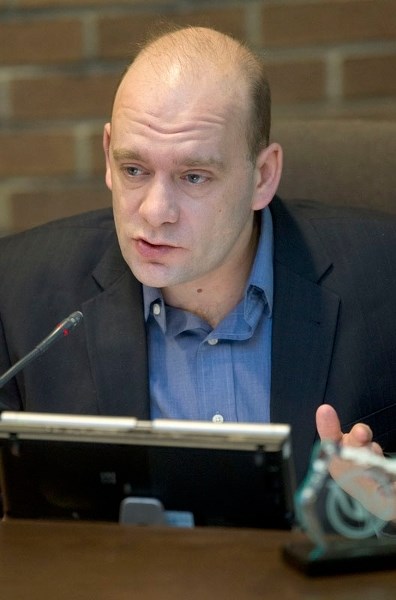By Kevin Ma
Should St. Albert experiment with direct democracy? It depends what you mean by "direct democracy," says an Edmonton expert.
City council voted 4-3 against a motion from Coun. Cam MacKay that would have made "experimenting and implementing direct democracy tools that facilitate residents to be able to vote and make decisions" part of the city's four-year strategic plan. Councillors MacKay, Sheena Hughes and Bob Russell supported the motion.
Many residents today are more informed about issues than councillors, and modern technology makes it easy to get their thoughts, MacKay said in support of his motion.
"I have quite often wondered if a small group of people with their own biases and self interests and personal feelings is the best way to make decisions for a community of roughly 65,000."
Supporting this motion would show that council wanted to hear what the public had to say, MacKay said.
"A rejection of this motion simply states that there is no need for improvement and the public does not need any additional methods to enable the community to be heard."
When asked what he meant by "direct democracy tools," MacKay said he meant finding new ways to solicit public input, adding that it would be up to council to determine the nature of those tools. He mentioned more binding plebiscites as an example.
"I think council needs you to explain what you mean," said Coun. Cathy Heron, who noted that many direct democracy ideas weren't legal under provincial law.
Coun. Tim Osborne agreed, saying that MacKay's motion was "ambiguous at best" in its wording. Some New England towns had experimented with direct democracy through town hall votes – where a large number of residents vote on policy issues directly instead of through elected representatives – for example, only to find that the votes were less democratic than representative democracy as only a small group of people showed up to vote.
"We're elected to make decisions," Osborne said, and it's council's job to consult as widely as possible. He supported the idea of getting people more involved with council, but said council's current goals already covered that.
He and other councillors rejected MacKay's statement that a vote against this motion was a vote against improved public consultation.
Democratic directions
Direct democracy is a broad term that typically means making decisions without the use of elected representatives, said David Kahane, a political science professor at the University of Alberta who works with the Edmonton Centre for Public Involvement.
One way to do that is through binding referendums, where people can petition to get policy measures put on an election ballot, Kahane said. California has done this for years, resulting in, among other problems, a chronically underfunded school system due to repeated votes to restrict taxes.
"It's a little like public opinion polls," Kahane said of these votes – voters don't have a great incentive to get informed, and special interest groups have a strong interest in swaying the vote.
Places like B.C., Oregon and Edmonton are experimenting with an alternative called deliberative democracy, where a super-informed and representative focus group makes non-binding recommendations to governments. Kahane helped organize such a group recently in Edmonton to help set the city's climate change policy.
Traditional polls and open houses aren't great ways for people to get involved in government, Kahane said: you answer some questions or put up a sticky note, but you don't see how your input gets turned into policy.
As part of its The Way We Green strategy, Edmonton assembled a citizens' panel of 56 people carefully picked to reflect the city's population profile and had them deliberate for six days on the strategy, all while backed by expert advice. The panel then voted on a list of recommendations, with 92 per cent agreeing that the city should become a low-carbon city by 2050.
Edmonton city council adopted a goal to become a low-carbon city by 2035 last April based on the panel's recommendations.
Deliberative democracy only works if you've got an exceptionally diverse group and a council committed to following the group's recommendations, Kahane said. It can be expensive, and is best suited for big, complex, value-based issues, such as climate change or poverty reduction – not technical ones like tax rates.
"I don't want my neighbour deciding on the mill rate for the city."
Visit centreforpublicinvolvement.com for more research on this subject.




